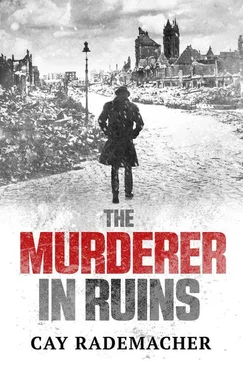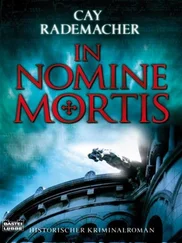Cay Rademacher - The Murderer in Ruins
Здесь есть возможность читать онлайн «Cay Rademacher - The Murderer in Ruins» весь текст электронной книги совершенно бесплатно (целиком полную версию без сокращений). В некоторых случаях можно слушать аудио, скачать через торрент в формате fb2 и присутствует краткое содержание. Год выпуска: 2015, ISBN: 2015, Издательство: Arcadia Books Limited, Жанр: Триллер, на английском языке. Описание произведения, (предисловие) а так же отзывы посетителей доступны на портале библиотеки ЛибКат.
- Название:The Murderer in Ruins
- Автор:
- Издательство:Arcadia Books Limited
- Жанр:
- Год:2015
- ISBN:9781910050750
- Рейтинг книги:5 / 5. Голосов: 1
-
Избранное:Добавить в избранное
- Отзывы:
-
Ваша оценка:
- 100
- 1
- 2
- 3
- 4
- 5
The Murderer in Ruins: краткое содержание, описание и аннотация
Предлагаем к чтению аннотацию, описание, краткое содержание или предисловие (зависит от того, что написал сам автор книги «The Murderer in Ruins»). Если вы не нашли необходимую информацию о книге — напишите в комментариях, мы постараемся отыскать её.
The Murderer in Ruins — читать онлайн бесплатно полную книгу (весь текст) целиком
Ниже представлен текст книги, разбитый по страницам. Система сохранения места последней прочитанной страницы, позволяет с удобством читать онлайн бесплатно книгу «The Murderer in Ruins», без необходимости каждый раз заново искать на чём Вы остановились. Поставьте закладку, и сможете в любой момент перейти на страницу, на которой закончили чтение.
Интервал:
Закладка:
‘You think we might be looking for some Nazi thug who’s stayed true to his murderous ideology even after the collapse of the regime and is waging some sort of one-man war?’
‘Maybe. Or someone who wants to dispose of inconvenient witnesses to deeds committed in the past.’
Stave thought for a moment. ‘But how does that help me? I can’t go through the history of everyone in Hamburg to find out what they might have been up to prior to 1945. And even if I could, and unearthed every misdeed, how am I to link that with the murders being committed now? We don’t even know the identity of the victims!’ Stave shook his head. ‘The only way we’re going to find the killer is by finding the names of his victims. When we know who they are, then we can start looking for connections. It may well be that they lead to the death squads of the past. My biggest hope at present is the little girl. She must have gone to school somewhere. There have to be teachers or schoolmates who can identify her. The two adults might have been recluses, but a child is always out and about.’
‘Good thinking,’ said Ehrlich, taking out an embossed sheet of paper with his name at the top, unscrewing the top of a weighty Montblanc fountain pen and writing a few lines on it. Stave watched in silence as he fluidly scrolled his signature beneath.
‘This is a letter of recommendation,’ Ehrlich told him, handing it over. ‘In case the girl might come from a family of DPs or persecuted Jews, then you should first check out Warburg Children’s Health Home in Blankenese. This letter should make it easier for you to gain access. But you will still need a permit from the British.’
‘A children’s home?’
‘A very special children’s home.’
Stave didn’t ask any further questions, nodded, folded the brief carefully in two and put it in his overcoat pocket, regretting that he’d sent MacDonald home early.
‘I’ll go to the lieutenant,’ he announced, ‘while it’s still light. Maybe I can get the necessary paper straight away. Then I can start asking questions at Warburg tomorrow morning.’
He got up and went to the door. As he opened it, the prosecutor called him back.
‘Happy birthday, by the way. I noticed the date in your file.’
‘Thanks,’ Stave murmured, somewhat taken aback. Ehrlich was the first person to congratulate him. On his forty-third birthday.
MacDonald lived in a requisitioned villa in Innocentia Strasse in Harvestehude, ‘Zone A’, an almost undamaged part of the city. The British and American bombing raids had been intended primarily to kill workers, and most of the leafy, well-to-do areas had been unharmed. Probably also, Stave thought to himself, because they realised that after they had won the war they would need somewhere nice for their officers to live.
On his way to Harvestehude the chief inspector found himself walking through Planten un Blomen, once the city’s finest park. As late as 1944 they had been planting rose bushes which ever since had erupted into a blaze of red every summer. In the meantime they had ploughed up the strips of land between the pathways and the rose bushes to sow potatoes. Now the transformed former park was covered with a partial layer of snow, dirty brown here and there, dirty white elsewhere; abandoned.
There were signs on the side streets: ‘Out of Bounds for German Civilians!’, ‘For British Forces Only!’. Freezing British military police stared past him indifferently. The grand villas were perfectly cared for, except for the few make-do stovepipes that occasionally jutted out. The trees along the streets were undamaged. There were tin bins outside the gates. It was calm between the villas, the houses and trees offering shelter from the freezing gusts of wind. Occasionally a military patrol jeep would trundle by over the cobblestones. A few figures sloped from bin to bin, one-legged war veterans, a man with a rucksack holding the hand of a girl of about ten, old people, women with headscarves wrapped tight so that nobody could see their faces and see their shame. They opened the lids of the bins, and rummaged inside for bit of rotten potato, wilted lettuce leaves, apple cores. A young cigarette-butt collector was picking up trodden ends of English cigarettes from the pavement. Nobody spoke, nobody looked up. The military police left them alone.
Colonial masters, Stave thought to himself. The English live here the way they do in India or Africa, and we’re their new coolies. Except that neither the Africans nor the Indians set half the world on fire and had only themselves to blame for their humiliation.
Innocentia Strasse: bare branches of young oak trees, jeeps parked at the side of the road, behind them rows of white, four-storied villas, maybe 50 or 60 years old. There was jazz coming from the window of one of them, the BBC maybe, or perhaps a record playing on a requisitioned gramophone.
House number 28. The chief inspector showed his police ID to a soldier standing guard at the gate and asked for MacDonald.
‘Third floor, second left,’ the Brit answered, in English of course.
He’s about the same age as my son, Stave reckoned, and at that moment he would have preferred to simply turn round and run away from there, out from under the oak trees back down to the railway station. But instead he simply nodded and climbed the grand staircase, trying to conceal his limp from the sentry’s eyes.
Stave knocked on the door. No answer. He knocked again. Maybe the lieutenant had gone out? He was about to turn away when he heard a noise behind the door. So he waited. Eventually MacDonald opened the door, barefoot, wearing just a shirt and trousers. The villa was heated but it was hardly warm enough for that.
MacDonald was out of breath, but he pulled himself together, and forced a smile. ‘What can I do for you?’
Stave, noticing that the lieutenant was blocking the doorway, took a step backwards and gave a gentle cough. He explained as quickly as he could about his visit to Ehrlich and the Warburg Children’s Health Home and the British permit he needed to go there. But even as he was speaking he glimpsed a shadow, a movement behind MacDonald’s shoulders.
Erna Berg.
Stave continued talking as if he hadn’t noticed. MacDonald glanced nervously over his shoulder, then looked at the chief inspector as if wondering whether or not to admit he had been caught out. Then he gave a brief smile and made an oblique, vaguely apologetic gesture.
‘I’ll sort it out,’ he promised. ‘We can go there together in the morning. It’ll be quicker in my jeep. And I’m curious too to see if we can find out anything there. I’ll pick you up from the CID headquarters. If you want, we can take Maschke too.’
‘Thank you,’ Stave said. ‘Enjoy the rest of your Sunday.’
‘You too,’ MacDonald called after him, but Stave had already turned away. He was in a hurry to get out of the house.
Survivors and Missing
Monday, 3 February 1947
They drove in silence, MacDonald at the wheel, Stave in the front passenger seat, Maschke on the hard bench behind. The vice squad man had to hold on tight to the jeep’s metal frame to avoid being sent flying every time they went over a pothole. He looked as if he was being driven to the dentist. The lieutenant stared straight ahead as they thundered down the Elbe embankment. The chief inspector watched him from the corner of his eye.
Nobody had said anything about their encounter the previous day. Erna Berg came into the office, as merry as ever. Either she had no idea I spotted her yesterday, thought Stave, or is so thick-skinned that she couldn’t care less if I caught her out. The fact was that Stave’s secretary was married, although her husband was on the ‘unaccounted for’ list. Theoretically she was committing adultery. But what has that to do with me, Stave told himself, and tried to concentrate on the interrogation ahead.
Читать дальшеИнтервал:
Закладка:
Похожие книги на «The Murderer in Ruins»
Представляем Вашему вниманию похожие книги на «The Murderer in Ruins» списком для выбора. Мы отобрали схожую по названию и смыслу литературу в надежде предоставить читателям больше вариантов отыскать новые, интересные, ещё непрочитанные произведения.
Обсуждение, отзывы о книге «The Murderer in Ruins» и просто собственные мнения читателей. Оставьте ваши комментарии, напишите, что Вы думаете о произведении, его смысле или главных героях. Укажите что конкретно понравилось, а что нет, и почему Вы так считаете.











